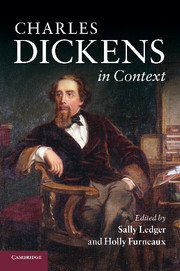Book contents
- Frontmatter
- Contents
- List of illustrations
- Notes on contributors
- Preface
- Notes on references
- PART I LIFE AND AFTERLIFE
- 1 The life of Dickens 1: before Ellen Ternan
- 2 The life of Dickens 2: after Ellen Ternan
- 3 Dickens's lives
- 4 Victorian stage adaptations and novel appropriations
- 5 Reviewing Dickens in the Victorian periodical press
- 6 The European context
- 7 Major twentieth-century critical responses
- 8 Modern stage adaptations
- 9 Modern screen adaptations
- 10 The heritage industry
- 11 Neo-Victorian Dickens
- PART II SOCIAL AND CULTURAL CONTEXTS
- Further reading
- Index
- References
5 - Reviewing Dickens in the Victorian periodical press
Published online by Cambridge University Press: 05 August 2012
- Frontmatter
- Contents
- List of illustrations
- Notes on contributors
- Preface
- Notes on references
- PART I LIFE AND AFTERLIFE
- 1 The life of Dickens 1: before Ellen Ternan
- 2 The life of Dickens 2: after Ellen Ternan
- 3 Dickens's lives
- 4 Victorian stage adaptations and novel appropriations
- 5 Reviewing Dickens in the Victorian periodical press
- 6 The European context
- 7 Major twentieth-century critical responses
- 8 Modern stage adaptations
- 9 Modern screen adaptations
- 10 The heritage industry
- 11 Neo-Victorian Dickens
- PART II SOCIAL AND CULTURAL CONTEXTS
- Further reading
- Index
- References
Summary
Writing to a distant Scottish friend in May 1843, Dickens announced: ‘When I first began to write … I suffered intensely, from reading Reviews. And I made a solemn compact with myself, at last, that I would only know them, for the future, from such General report as might reach my ears. For five years I have never broken this Rule once’ (Letters, iii, 493). This is as interesting as it is evidently untrue. Not least, as George H. Ford marvelled in 1955, because of the ‘hoary unanimity among biographers’ who have accepted ‘without question [t]his oft-repeated assertion’. There is still a tendency to set store by it, in spite of Ford's publication of a detailed appendix listing, with evidence, some thirty-four reviews published between 1836 and 1866 which Dickens definitely, probably or possibly read (263–6). Ford and, later, Kathryn Chittick have therefore rightly clarified that Dickens's ‘resolve not to read criticism in fact specifically meant an avoidance, not of reviews but of attacks’. Nor did this preclude retaliation.
Indeed, earlier in the above letter, Dickens confessed to having ‘a strong spice of the Devil in me; and when I am assailed, as I think falsely or unjustly, my red hot anger carries me through it bravely’ (Letters, iii, 493). For several months before announcing his abjuration of review reading, Dickens had been, in his opinion, assailed both falsely and unjustly on both sides of the Atlantic during a war of words stirred up following publication the previous October of his eagerly awaited volume of travels, American Notes, and much of his anger – especially with the New York press – was channelled into the American episodes of Martin Chuzzlewit (1843–4).
- Type
- Chapter
- Information
- Charles Dickens in Context , pp. 35 - 42Publisher: Cambridge University PressPrint publication year: 2011



